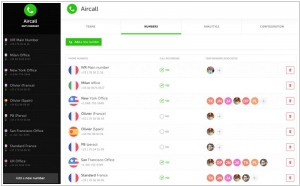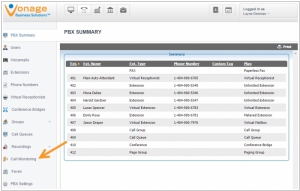Aircall vs Vonage
June 09, 2023 | Author: Adam Levine
Aircall and Vonage are both popular cloud-based phone system providers, but they have distinct features and differences that set them apart. Aircall is designed to offer a seamless and intuitive phone system experience, focusing on features like call routing, call queuing, and real-time analytics. It provides integrations with popular CRM and helpdesk tools to enhance productivity and streamline workflows. Vonage, on the other hand, offers a more comprehensive unified communications solution that includes voice, messaging, and video conferencing capabilities. It provides advanced features such as call recording, virtual receptionist, and team messaging. Vonage is suitable for businesses that require a broader range of communication tools beyond traditional phone systems.
See also: Top 10 Business Phone systems
See also: Top 10 Business Phone systems
Aircall vs Vonage in our news:
2021. Ericsson to acquire cloud communications company Vonage for $6.2B

Ericsson, an international networking company, has made the strategic decision to embrace modernization by acquiring cloud communications company
2021. Aircall raises $120M for its cloud-based phone system

Aircall has secured a $120 million Series D funding round. The company is focused on developing a cloud-based phone system designed for call centers, support lines, and sales teams. It offers seamless integration with popular CRM, support, and communication systems such as Salesforce, HubSpot, Zendesk, Slack, Intercom, and more. Aircall enables its customers to create local numbers and establish interactive voice response directories. The service efficiently manages call queues, allowing agents to promptly respond to incoming calls. Agents can also transfer calls and put customers on hold, while administrators have access to analytics, call monitoring, and performance tracking for effective management of the team.
2020. Aircall raises $65 million for its cloud-based phone system
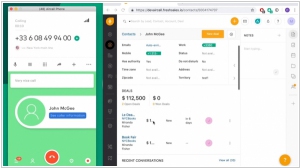
Aircall, a software-as-a-service company focused on phone calls, has successfully raised $65 million in a Series C funding round. Aircall aims to distinguish itself from conventional call center solutions by offering seamless integrations with third-party services. As an example, users can view their call details within their CRM system to determine if a team member has already addressed a lead. Additionally, urgent support requests can be promptly handled by initiating phone calls directly from Zendesk.
2018. Vonage acquired cloud-based contact center startup NewVoiceMedia
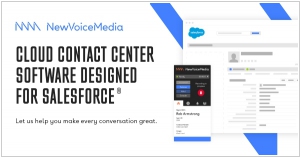
Vonage, a cloud-based unified communications provider, has completed the acquisition of NewVoiceMedia, a UK startup specializing in cloud-based contact center solutions, for a cash sum of $350 million. This strategic move by Vonage aims to expand its service offerings and increase profit margins across a broader range of value-added IP services. Currently, Vonage provides office phone systems, marketing automation, an existing call center solution, as well as MPLS and other IP services. With the integration of NewVoiceMedia's platform, Vonage will have enhanced capabilities to establish deeper connections with software providers such as Salesforce. This integration is vital to Vonage's approach in selling its services to potential customers. NewVoiceMedia is recognized by Vonage as the largest privately-owned, pure-play, cloud contact center company globally. It boasts approximately 700 customers, primarily consisting of mid- to large-sized enterprises, including prominent names like Adobe, Siemens, Time Inc., FundingCircle, and Rapid7.
2016. Aircall launched mobile apps for its cloud phone system
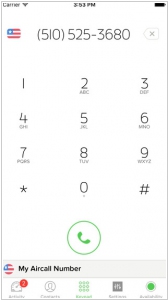
Aircall, the service that enables you to generate virtual numbers in numerous countries worldwide and share them with your team, has recently launched its mobile apps for iOS and Android, moving out of the beta phase. With these new mobile apps, Aircall customers can conveniently receive or make VoIP calls directly on their phones, without being confined to their desks. Unlike other customer support software, Aircall does not require any specialized hardware and operates on a software-as-a-service model. Aircall facilitates contact and schedule sharing, call assignment to specific team members, and provides detailed tracking of activities. This feature proves invaluable in keeping track of client interactions and whether your colleagues have already dealt with a particular client.
2006. Vonage to introduce the V-Phone
Vonage has provided a preview of its upcoming device called V-Phone, a USB device that enables voice over IP users to make calls from any broadband-connected computer. When plugged into a computer, the V-Phone carries Vonage software, transforming the computer into a phone. The new product was unveiled by Jeffrey Citron, the chairman of Vonage, during the Convergence 2.0 conference in New York City. The official launch of the V-Phone is scheduled for Wednesday at a press event in New York. Citron, who did not take questions during Monday's presentation, will be speaking again on Wednesday. Vonage is currently dealing with numerous shareholder lawsuits following its troubled initial public offering, and its stock has significantly declined in value since its debut. Additionally, Verizon Communications has filed a patent infringement lawsuit against Vonage, alleging infringement on patents related to completing calls between Internet phones and traditional telephone networks.
2005. VoIP firm Vonage tests routers for mobile service
Vonage, an Internet-based calling services provider, is conducting customer trials for wireless routers, indicating that the company is nearing the launch of a mobile offering. The trials involve a new Linksys Wi-Fi router that Vonage may offer alongside its calling plans. Additionally, Vonage has acknowledged that customers are testing a Wi-Fi-enabled handset. With the router and handset, users would have the freedom to move around their homes or offices without being connected to a modem or phone jack, eliminating the need for a laptop or desktop computer. Vonage could also market the routers to hot spot providers for installation in public locations. The introduction of these routers aims to address issues that VoIP users face in Wi-Fi hot spots. Vonage and other VoIP companies are capitalizing on mobility, similar to cell phone operators, as they seek to expand their services. The growing support for Wi-Fi is a positive sign for the VoIP industry.
2004. Vonage goes to the video
Vonage, an internet phone service provider, plans to launch videophones and a videophone service by the end of March, according to CEO Jeffrey Citron. While an exact release date and pricing details were not provided, Vonage's videophone service is expected to be similar to Packet8's offering, which provides unlimited video calling for $30 per month. Vonage has partnered with Viseon, a broadband video equipment manufacturer, to develop the videophone, which will resemble Viseon's VisiFone II. The addition of videophone service is part of Vonage's expansion into value-added services in the VoIP (Voice over Internet Protocol) market. Other VoIP providers, like VoicePulse, are also planning to introduce videophone services. Despite the relatively small market for video-calling gear, Citron believes that recent advancements in chip designs and the collaboration of videophone manufacturers have made the technology more affordable and feasible. Additionally, the increasing speed and reliability of broadband connections have helped overcome previous barriers to widespread adoption.
2004. Vonage cuts Net phoning prices
Vonage, a prominent internet phone service provider and a key player in the field of voice over Internet Protocol (VoIP) technology, has joined the ranks of leading Net telephony companies in reducing prices as part of an ongoing battle for customers. On Monday, Vonage announced a significant price reduction for its monthly unlimited North American dialing plan, lowering the cost from $35 to $30. This new pricing aligns Vonage's subscription rate with the industry standard for Net phone call plans, which leverage the unregulated internet infrastructure rather than the heavily regulated and taxed networks of traditional phone companies. By reducing prices, Vonage's move is likely to prompt smaller competitors to follow suit and further decrease prices to maintain a competitive edge. However, Vonage does not anticipate making further price adjustments until it achieves its target of reaching 450,000 subscribers, a milestone expected to be reached in the fall of 2005.
2003. Vonage drops Cisco VoIP adapter
Vonage, the broadband telephone service provider, announced on Monday that it has replaced Cisco Systems with Motorola as its exclusive supplier of telephone adapters. Under the deal, each week's approximately 2,500 new subscribers will receive Motorola's VT1000v Analog Telephone Adapter, which allows traditional home or office phones to make calls over the internet, bypassing additional charges from telephone companies. While Vonage continues to use Cisco network gear, Vonage CEO Jeffrey Citron explained that Motorola's adapter was chosen for its lower cost and the ability for subscribers to make phone calls while simultaneously using the internet on their PCs or laptops. Citron cited Cisco's failure to meet Vonage's desired price points and adapt to market demands as the reasons for the shift to Motorola. He also noted that this move opens up opportunities for competition to challenge Cisco's dominance in the voice over Internet Protocol (VoIP) equipment sales market. In response, a Cisco representative emphasized the company's commitment to delivering advanced technologies and catering to the needs of service providers. Despite its relatively small subscriber base of 75,000, Vonage has gained recognition as a major broadband phone company due to its ongoing battle with state regulators over regulatory oversight of its telephone service.

